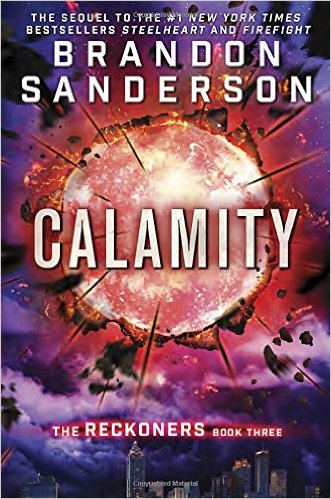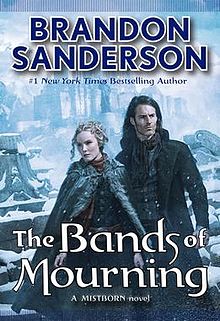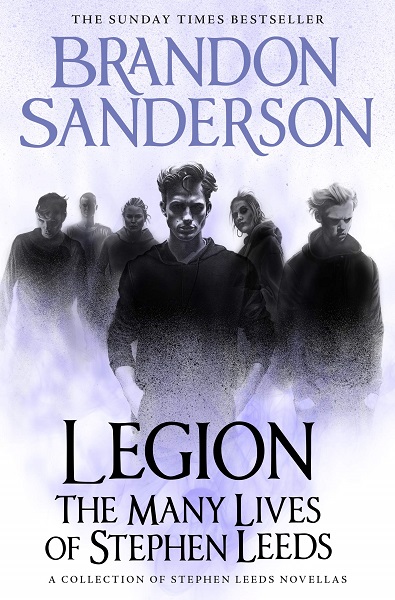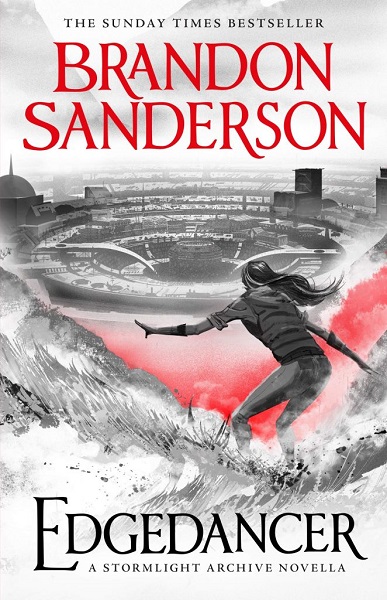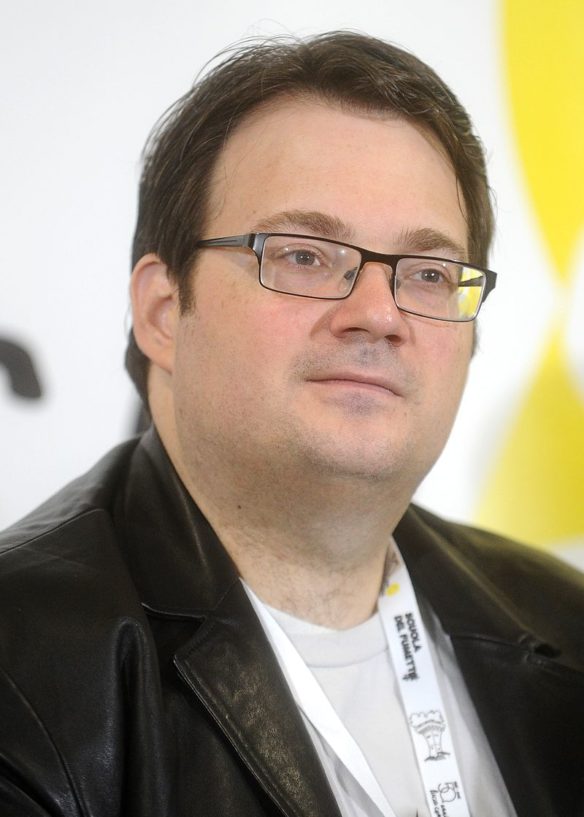
Brandon Sanderson. Photo by By Niccolò Caranti. 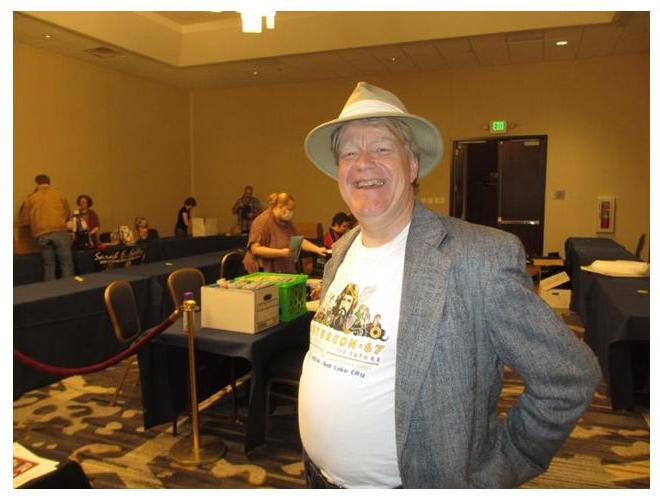
Dave Doering at LTUE in 2016.
Here are selections from the Brandon Sanderson Interview conducted by Dave Doering at World Fantasy Con 2020 on Saturday, October 31.
- Brandon Sanderson’s first published novel, Elantris, came out from Tor in 2005. Tor also published six books in his Mistborn series, and the first three in the planned ten-volume series The Stormlight Archive. Five books in his middle-grade Alcatraz Versus the Evil Librarians series were released by Starscape. Brandon was chosen to complete Robert Jordan’s Wheel of Time series. Since then his work has included the Reckoners trilogy, and the Skyward series. He also hosts the Hugo Award-winning Writing Excuses podcast with Mary Robinette Kowal, Howard Tayler, Dan Wells, and others.
- Dave Doering is the founder of Life, the Universe, and Everything, a conference held annually in Utah. He also started the Leading Edge magazine at BYU. He works as a business and technical writer.
DAVE: As we start our session today, Brandon, I wanted to borrow the approach from inside the Actor’s Studio and ask some general questions that I find fun:
What is your favorite word?
BRANDON: My favorite word changes. The word I overuse is maladroitly. Fans picked up on this early. Now my pet word is probably “miasma” or “inchoate”. I really love the word inchoate. But my editors tell me that’s a “once a book” word.
DAVE: What turns you on?
BRANDON: Writing a new story.
DAVE: What turns you off?
BRANDON: Fish sticks. I really hate fish sticks.
DAVE: What’s your favorite curse word?
BRANDON: I don’t really curse, so I don’t really have any. However, when I was working on Mystborn, my 14-year-old sister went through it and crossed out all the curse words. (I was using “damn” and “hell”.) I didn’t consider those curse words but she was “ARR!”
She wrote in replacement suggestions for me to use. One was where I called a character a “damn fool”. She suggested i call him a “bone-doggey-head” instead. So that’s my favorite curse word since then. My 14-year-old sister suggestion: “Bone doggey head”. (That did not end up in the final manuscript, by the way.)
DAVE: What career would you follow now if you weren’t a writer?
BRANDON: If I weren’t a writer, I would hope I would have found some type of creative field to work in. Because doing something new each day and filling an empty page, making order from the chaos, is very, very excting and engaging to me.
Most realistically? I would have ended up as a professor. Because I do like academia. I do like teaching. If the writing hadn’t taken off that would have been one of the few careers open to me in what I was doing.
The thing is: I doubt if I would been able to make it because being in academia and gaining a tenure-track position today, particularly in the Arts, is really hard. There’s a lot of competition for those few places. What I am writing is Popular Fiction, and I don’t think I could have gotten off at any institution with a tenure-track position. I’d probably be some type of adjunct and live hand-to-mouth.
DAVE: In the next hundred years or so, when you leave this world, what do you hope that Robert Jordan will say to you at the great AfterCon? (And hoepfully not, “Well, Brandon, how DOES the Stormlight Saga end?!”)
BRANDON: I am hoping he says, “Good job!” “Good job but not as good as I could have done but you didn’t embarrass me kid!”
DAVE: What’s the latest on your movies and TV series?
BRANDON: Good question. About three years ago, I sold a lot of things in Hollywood. This was kind of to a group I was hoping would be able to get them made. And as has always happened with me, nothing really ended up happening. I have gotten most of those rights back and I’m kind of sitting on them, trying to decide what I want to do.
There is nothing that is particularly close right now. I still have some of my things sold in Hollywood, but I’m starting to sit on the mall and just trying to assess what it is I want to do.
Hollywood’s an interesting place. I’ll tell you my favorite Hollywood story. Right when I was brand new, I sold my Middle Grade Evil Librarian series. My agent came and said, “Hey, somebody wants to buy this in Hollywood.” I’m like, What?? I didn’t know that anyone would be interested. This was before the first book had come out.
But Lemony Snicket was big at that point so I guess they were looking for things like that. So DreamWorks Animation optioned this in my second or third year that I had gone pro. They paid like $35,000 which at that point was what I was living on. (I was not making a ton for my books.) So that was really an unexpected bonus. I was perfectly happy to sell those rights and I still think of it as a great experience because, well, that’s what I lived on.
What they did was take several different properties and be working on them–kind of with competing teams within DreamWorks Animation. They would bring them to Jeffrey Katzenberg and the heads of the studio. The teams would do these pitches, and Katzenberg would say yes or no, greenlight or no. It was not unusual that it took them two to three years to get everything ready. So they did all this.
They flew me out to DreamWorks. I got to go tour and see the storyboards they’re coming up with and all these things. Eventually our big day came where they took the screenplay and storyboard, all this stuff, in to pitch to Katzenberg. I was waiting with bated breath at my phone. Eventually the phone call came in. I picked it up and the first words out of his mouth were “Great news Brandon!”. I’m like, oh, they liked the pitch. They said yes, Katzenberg said this is probably the best screenplay he’s ever read. I’m like, wow.
Jeffrey Katzenberg has been in the business a long, long, long time. So my story is one of the best screenplays he ever read. Then I said, “I guess we’re greenlit then.” He says “Actually, no. He passed on the project. It’s dead in the water. We’re not renewing the option.”
I’m like, wait, what, what, how?? How is this good news? He loved the screenplay. If he loved the screenplay, why is he not making the movie?
They explained that he thought it felt like it was more of a live action than an animated one. So even though he really loved it and everything, they were passing. This is just kind of what happens.
I’ve found in Hollywood, nobody wants to give you bad news. Nobody really takes a lot of time to inform the author of what’s going on. You hear well, well down the line ” Great news. It’s dead” quite a bit. That’s what educated me about what happens in Hollywood.
DAVE: So at what moment, Brandon, did you realize that you wanted to be a writer?
BRANDON: It was later than a lot of people. A lot of my friends were writing when they were two years old. With me, I became a writer when I was in my late teens. What happened is I had had a great teacher.
It was in Middle School –the eighth grade. My teacher’s name was Miss Raider [?], by the way. True story. My English teacher got me reading fantasy novels. Before that, I was not a big reader. She had picked up on the fact that I was reading below my grade level. She convinced me to try reading a book. It was by Barbara Hambly–Dragonsbane. I fell in love with books. I actually remember going to the school library and flipping through the things in the card catalog. (All the books in the school library were alphabetized in the card catalog. You could look up books by author or by title. (Okay, this was a long time ago.)
I read Dragonsbane and I just loved it. I’m like, Is there anything else like this?? Well, if there’s anything else like this, maybe it’ll have dragon in the title. So I went to the card catalog and I found Dragonflight by Anne McCaffrey next to it. And I’m like, Well, I guess I’ll try this one. I dove headfirst into reading all the fantasy books I could get my hands on.
Over the next couple of years, I really fell in love with reading this genre. I started to think “maybe this is what I want to do”. It was because these stories just made me feel powerful emotions. I’m not a guy that generally is very emotional. Even as a high school student, I was not very emotional. But these stories really said something to me. And I wanted to learn how writers did that. How they made me feel like I was in this other place and experiencing all these things. So I started my first book, probably when I was 16, or 17. (I never finished that one.) I started another one after a year of college at 19. That one I did finish. And I just kept going. I wrote 13 before I eventually sold one.
DAVE: Well, congratulations. Did that take you, what?, about three weeks of writing?
BRANDON: Ha, ha! You assume I am a very fast writer. But I am really not a very fast writer. People misunderstand this, I’m just very consistent.
I write around 2000 words a day. But I only get to work four days a week these days because I have to spend one of my days on things like publicity and interviews. Working on other projects for the blog and things like that. So four days a week I write around 8000 words–about eight to ten thousand a week. I may be slightly faster than average. But I’m not horribly fast. I’m just I just keep doing it. And I I tend to enjoy it. So that’s what happens:
I just do that really consistently. That’s the secret to my success.
DAVE: That’s interesting. I’ve heard stories of you getting on the plane in Los Angeles and arriving in Australia with a completed novel.
BRANDON: Yeah, people love to tell those stories. I’ll tell you part of why those stories started up. Early in my career after I started publishing, it’s very common to turn in a book and a publisher would sit on it for two years or so to get all the editing done.
For instance, my first book I turned in the first draft in April of 2003. It came out like May or June of 2005, right? That was a very common. That’s a very common release schedule in traditional publishing. When I started to take off, my book sales starting to go up, my publisher started to say, “Wait, why are we sitting on this Brandon Sanderson book? Why not publish it now? So it’ll affect our bottom line now? And it’ll look really good to all, you know, the investors and the higher ups?”
Suddenly, all these books that I had been sitting on, like, I’d have three books waiting for publication, they started publishing them just several months apart from one another. So there was a period in my career when it looked like I was writing 300,000 word novels every three months because they suddenly were publishing everything really quick. We kind of got to the end of those. From then on my schedule’s been about a book a year.
So from that I got quite the reputation for being very fast. But most of that was my publishers rearranging of schedules in order to have Brandon Sanderson books coming out sooner.
DAVE: I’m curious about your early life in Nebraska. What did you carry away from Nebraska that has influenced you as a writer?
BRANDON: It’s hard to say honestly. I can point to Utah a little bit more since I moved out here in college. I went with a friend of mine who is a photographer down in southern Utah. A lot of people can pick out the southern Utah influence on things like the Stormlight Archive, which takes place in some chasms that feel very much like Little Wildhorse from Southern Utah, but I did I grew up my I I went to high school I was I didn’t move to Utah till I went to college.
I spent all of my my younger years in Nebraska. It was a really nice place to grow up. I had great teachers. I had good friends. Everyone’s really nice in the Midwest.
I still miss some of the Nebraska stuff. My favorite fast food found only in Nebraska is runza [a dough bread pocket with a filling consisting of beef, cabbage or sauerkraut, onions, and seasonings]. I do miss that.
I don’t miss the weather. Nebraska’s weather is not something to crow about. Let’s just say it’s hot and muggy in the summers and it’s cold and blizzarding full of snow in the winters. I much prefer it out here [in Utah] for that. You know, I always like Nebraska, if it had at least mild winters and mild summers. You should have to have that trade off. You have these terrible winters? Shouldn’t you have to be able to have mild summers, but nope.
The biggest lasting influence that I had really great literacy professionals and teachers all through high school and college who are just really good at helping encourage learning in students. I thank them and I have sent them some books, because I really do owe a lot to those teachers.
DAVE: You spent two years in Korea. How has that experience impacted your writing?
BRANDON: That’s a really good question. For those who don’t know, I was serving a mission with my church. I lived in Korea, learned the language and things there for two years. Number One, the linguistics had a big effect on me. I’d studied French all through high school, but there’s nothing like going and living and having to immerse and learn the language to actually teach you.
I remember going to France when I was in my junior year of high school. I was thinking “Man, I’ll be able to speak speak to everyone.” My French was so terrible, I couldn’t. I could barely ask people to pass the baguette. It was just awful.
Living in Korea, I didn’t have that choice. I was there for two years, not for two weeks (like I had been in France). Really getting into another language and learning to speak it, particularly one that has some grammar that’s very different from English, was super handy for me. Just kind of changing the way I looked at the world, learning another culture and living in another country. One that just has different social mores and things was really handy for me when I wanted to look at developing fantasy cultures. Not that I base them on Korean or Korea but the ideas, it’s like first hand experience of how different cultures can be.
It was instrumental in helping me when I researched to make a new culture. I think I have a much stronger foundation for understanding some of these elements than I would have had if I hadn’t lived in another country for two years. There is a lot from my studies, (I went on to have a Korean minor in college), that does end up in my books specifically from Korea.
DAVE: How has your faith then impacted you as a writer?
BRANDON: Many know I’m a member of the Church of Jesus Christ of Latter Day Saints. (I spent those two years in Korea as a missionary.) My faith makes me want to treat people’s belief systems with respect. (Nothing bothers me more than finding a book where there’s somebody that is like me, only to find that they exist to be proven wrong by the narrative.)
I kind of made the decision that because I’m so interested in all this, I’ve got to be really careful that I’m presenting other people’s belief systems or other people’s humanism, as well as I would want myself and the way I think depicted in stories, it is fascinating to me the various ways that people interact with Deity, or with with religion.
I explore the world through writing. My goal is not to go in and try to teach anything specific. My goal is to go in and to really explore who a character is, and what they believe, and why. Why they believe what they do.
DAVE: How did you make the transition then to become a writer?
BRANDON: My mother had convinced me to go to college as a chemistry major. Now my mother’s a very smart woman. She graduated top of her class in Accounting. In that era, she was the only woman in most of her accounting classes.
But she thinks like an accountant, and becoming a novelist was not necessarily a thing that seemed to add up to her on her balance sheets. She’s like, you know, if you want to be a writer, you should go become a doctor. Doctors have lots of free time, they always going golfing. So you could write books instead. So I went, and I was a chemistry major my freshman year at college. I did not enjoy it. They were there to do exactly what they did to me to ask: “Are you really sure this is what you want to do? Because this is what your days will be full of, if you major in this. So whoever designed those classes did exactly the right thing. They said, “Hey, chemistry in college is not chemistry in high school. Chemists become a chemist as a job.”
A doctor is what my mom wanted me to be but you know, there’s a whole lot of things involved in this that you got to be okay with. I washed out of that real quick and said, “No, my true love is writing, why am I here? Why am I spending all this time on these classes? I need to be a novelist.”
Korea was two years where I got to leave all that behind. Kiind of focus on something else for a while and really think about who I am, what I wanted to be, where I wanted to be. It was really great for that because it had me working pretty hard. That’s what life is like on the mission. We tend to get up early. That was a good regimentation for me. (I tend to have a bit of an artistic personality, which means that I could sleep in and maybe never get to my work.)
I came home from that and said, “You know what? I’m just gonna apply this to becoming a writer. I’m young, I’m stupid, everyone says it’s going to be a bad career choice. But I might as well do it when I’m young. I know that I’m pretty far behind a lot of other people who want to be writers, because I didn’t start until I was in my late teens. So I’m just going to work harder than them.” That’s why I started writing those books. That’s why I wrote so many, as I said. I got to give this a shot. So the next 10 years or so were just me working a graveyard shift at a hotel, writing books, and trying to figure out how to become a novelist.
DAVE: Why did you choose fantasy over science fiction? Your early science is very engaging and very compelling. So why Fantasy?
BRANDON: Why did I choose fantasy? When I first started writing, I did try a bunch of different genres. I had had good advice, which I think still is good advice, to try to write broadly, and do a lot of different things early in your practicing career. To really see if you can settle on what it is that you love to do. I’ve had many friends who thought they were one type of writer and then found their voice and in different genre entirely.
I wrote my first five books. Two of them were epic fantasies. They were basically the same book with a sequel, right? I just decided it’s long enough. I’ll end it now. Even though it wasn’t the ending. This happens to a lot of first time novels. I’d write the sequel and then I wrote a comedy, kind of a Bob Asprin’s-style comedy. I wrote a cyberpunk. I wrote a space opera. I just like doing that big survey, surveying the different genres. I did settle on fantasy as the thing I wanted to do.
There are a couple reasons for this. Number one, it was my first love as a reader. It is the thing that if I were going to pick a book, just off the show randomly, chances are good that you would find it is an epic fantasy book. That’s just the number of books that I owned of that genre were much more so what I really, really loved. It was an exciting time to be a fantasy fan, right? Because epic fantasy in particular can be argued as a little newer than science fiction. I feel like a lot of the innovations that were happening during the Silver Age of science fiction were happening in fantasy when I was a young man reading the genre in the 70s. When we started to see things like Sword of Shannara, it’s when we saw Dungeons and Dragons, it’s when we saw Star Wars. (We won’t get into the Star Wars “is it fantasy or science fiction?” argument here. But there are definitely fantastical things in that.)
I felt like as a reader, I was seeing new things all the time. There was more space in the fantasy genre to innovate than there was in science fiction. It’s part of what made me really excited. What I really like are and my first love are, these epic fantasy stories told in worlds that feel like science fiction worlds, that have the use of science fiction, some good old fashioned science fiction, world building, and extrapolation. They have these magic systems that stand with one foot in the fantastic and one foot in the scientific.
The books I’m writing are the handshake between the two sides. That is what I love, that is where I found my voice. That made me really excited to be writing these stories. I still enjoy science fiction quite a bit, I have written my fair share of it. But one of the things is I don’t feel like I read widely enough in science fiction, to really be leading a conversation. Anything I write in science fiction is not leading the conversation. Certainly, I hope that I’m doing things that are fun, interesting, exciting, and innovating. But I just cannot lead that discussion.
I can lead a discussion on where fantasy is going, right? I can be one of the people on the forefront of exploring what the genre can do. Because I have the background and the current reading knowledge to really add to that conversation in a way I just can’t in Science Fiction.
DAVE: Your ability to carry on this conversation with readers is on a global basis. I remember vividly your story of doing a book signing in the Middle East where maybe differently dressed fans stood in line to get you to sign your books. Different culture, but the same love of your works. How does an American fantasy writer have this appeal worldwide?
BRANDON: I think that stories have an appeal worldwide. One of the great powers of storytelling is it brings us together. It helps us see inside the mind of someone very different from ourselves. And that is, that is what you know, that’s why a lot of us writes why I writes why I read. I want to get inside this other person’s head, I want to see the the world that they create, and they want to, you know, be part of their life in a small way. And that’s why I think one of the reasons we love books.
DAVE: How do you balance your writing with your family life?
BRANDON: You know, this is something I don’t think we talk enough about in the genre, or in the business of writing, I should say. It’s not impossible to have a regular life as a novelist. You don’t leave your work at work when you’re a novelist. I have a friend who likes to quip it’s great being self employed, you only have to work half days, and you get to decide which 12 hours that is. That is really an astute comment. Because you could write, as an author, 16 hours a day. You could write more than 16 hours a day, as the story sometimes will not leave you alone. This is part of what is exciting about the genre.
But it’s also very dangerous side about the business. It’s very dangerous because it is easy to ignore the other things in your life when you are a writer. I do think that there’s a much higher chance of authors having problems with substance abuse and some of these things, and self-medication, certain mental health issues and things like that among novelists. I can totally see why.
To illustrate an example of this. I remember when I was newly married. I went out with some author friends and my wife. I thought we had this wonderful dinner where we are talking all about the stories we’re working on. After dinner, I said to my wife, “Wasn’t that a wonderful dinner?” She says, “Well, you didn’t look at me once during dinner, I felt like I was invisible.”
This is very common among writers–to treat the people around them like they’re invisible. This is a big danger, I think. It was something that I had to realize I was doing. When I got into the storytelling mode, which happened a lot and still happens a lot, everything else faded. People felt ignored, justifiably, because they were getting ignored. I had to set up some strict boundaries in my life.
I recommend that, that writers or creative professionals or anyone who has a job that is very difficult to leave at work. Have some conversations with their loved ones about this. And what we kind of talked about is I realized I needed to, from a certain part of the day, I needed to wall that off from writing. I had to be like, I can’t write from from 5:30pm until 9:30, at night. That time can’t be used for writing, I had to take it off the table. I’ll spend time with my family if my family’s around. I had to just turn this into a firewall of time that is for family and not for anything else. By putting that firm structure in place, it’s actually been really good for my writing.
The thing we don’t acknowledge is: it’s really easy to burn out. In this business, it’s really easy to let those 16-hour days pile on top of one another. To the point that you get sick and tired and physically ill and start hating the thing that you once loved. It’s not good for us that we do this. By walling off a section has really been good for centering my life and for making sure that I turned into a slow and steady writer and not a mad, serious writer. Doing writing all the time. If my family’s not home, I can’t write during that time. It’s important for me that that not be writing time. I could read, I can do other things. But I cannot work on a book.
It’s really, really important we have these conversations. My wife said, “you know, one of the things I’ve noticed that you need is when you’re writing, you need to be left completely alone. This is very common for writers that a small interruption, when you’re in the zone, can mean big ramifications for how much you’re able to get done during that time. We need to be distraction-free.” She kind of became the guardian of my time. “I’m gonna make sure that Brandon is not interrupted during the times when he needs to be writing. And Brandon’s going to make sure that the times that he doesn’t need to be writing, that this time is for family and it is actually family time.”
It’s been really, really healthy.
For me, I usually only write five to eight hours a day. I do two four-hour sessions. Usually I’m getting up at around 12 or 1. I’m working till about five. I then get ready, take a shower, and spend 5:30 to 9:30 with my family. Around 10 o’clock, I go back to work till about 2am. As long as I’m hitting my word count goals at about 2, I’m free to go do something else. Play a video game, read a book, whatever. Usually by then, two four-hour sessions, I’m feeling mostly that my mind has been plumbed. There is nothing left to do.
If I’m really into something, I’ll take those two hours and I’ll keep going. So I have those two hours wiggle room that I can add more time if I want to in the day. Sometimes, I’ll add on a Saturday if I’m behind on a deadline. But it’s been really healthy for me. And what I find is, you know, people think that I’m a really fast writer, but by having this structure in my life, I don’t burn out. I’m very consistent, and I am able to keep doing this thing that I really truly love without having a lot of the side effects that could be dangerous and destructive.
DAVE: When do you find time in that brief 8-hour workday to do editing?
BRANDON: If I am editing a book, it is the main thing that I am doing. If I am not creating 2000 new words each day, I am in revision mode. In terms of words a day, it depends on how difficulat the draft is I am working on. A final polish is a bit easier than, for instance, the Alpha Read draft where I am making major changes based on editorial feedback on the book.
I can revise or edit between 8000 and 15000 words a day in the 8-hour workday if I am not doing significant changes. 15000 is when I am making small tweeks as I go along in polishing and things like that.
DAVE: Let’s look at some general questions from the audience. Who’s your favorite character in your works?
BRANDON: I will borrow from Robert Jordan on this one. He always answered this question this way (or at least when I have heard him answer this in several interviews): “Whomever I am writing at the moment!”
I really like that answer, so I am going to steal it, because it is true. Whatever you are writing at the moment, whichever character you are writing at the moment, you need to see the world as they see it. You need to see it and be excited about writing about them. I try to make sure that is the case.
DAVE: Who do you turn to for input on worldbuilding? How do you avoid being distracted by all their input?
BRANDON: I turn to my writing group first. They are a group of friends and collegues that I have been sharing my work with since the early 90s. They know me as well as anyone does. They are very good at not pulling punches. That’s my initial group.
As for becoming distracted–it’s Discipline. I give myself a certain amount of time to write the book I am working on right now and focus on it. This rather than spreading my attention around on all the potential thiings I could be doing.
That focus was very important for me to learn. It’s part of what held me back early on from getting published. I did not have that focus early in my career. I was not willing to dedicate the time to polishing an individual work. Enough so that it was publishable. I would always move on to the next thing.
Certainly I had enough focus to finish the first draft, but not enough to finish the book. I find I need about five good drafts to make a book publishable and that I am proud of. If I don’t get four or five drafts it’s not going to be there.
Discover more from File 770
Subscribe to get the latest posts to your email.

